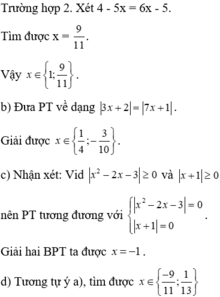Hãy nhập câu hỏi của bạn vào đây, nếu là tài khoản VIP, bạn sẽ được ưu tiên trả lời.

1/ \(7x-5=13-5x\)
\(\Leftrightarrow12x=18\)
\(\Leftrightarrow x=\dfrac{3}{2}\)
Vậy: \(S=\left\{\dfrac{3}{2}\right\}\)
==========
2/ \(19+3x=5-18x\)
\(\Leftrightarrow21x=-14\)
\(\Leftrightarrow x=-\dfrac{2}{3}\)
Vậy: \(S=\left\{-\dfrac{2}{3}\right\}\)
==========
3/ \(x^2+2x-4=-12+3x+x^2\)
\(\Leftrightarrow-x=-8\)
\(\Leftrightarrow x=8\)
Vậy: \(S=\left\{8\right\}\)
===========
4/ \(-\left(x+5\right)=3\left(x-5\right)\)
\(\Leftrightarrow-x-5=3x-15\)
\(\Leftrightarrow-4x=-10\)
\(\Leftrightarrow x=\dfrac{5}{2}\)
Vậy: \(S=\left\{\dfrac{5}{2}\right\}\)
==========
5/ \(3\left(x+4\right)=\left(-x+4\right)\)
\(\Leftrightarrow3x+12=-x+4\)
\(\Leftrightarrow4x=-8\)
\(\Leftrightarrow x=-2\)
Vậy: \(S=\left\{-2\right\}\)
[----------]
1. \(7x-5=13-5x\) \(\Leftrightarrow12x=18\Leftrightarrow x=\dfrac{3}{2}\)
2. \(19+3x=5-18x\Leftrightarrow21x=-14\Leftrightarrow x=-\dfrac{2}{3}\)
3. \(x^2+2x-4=-12+3x+x^2\Leftrightarrow-x=-8\Leftrightarrow x=8\)
4. \(-\left(x+5\right)=3\left(x-5\right)\Leftrightarrow-x-5=3x-15\Leftrightarrow4x=10\Leftrightarrow x=\dfrac{5}{2}\)
5. \(3\left(x+4\right)=-x+4\Leftrightarrow3x+12=-x+4\Leftrightarrow4x=-8\Leftrightarrow x=-2\)

1/ \(2\left(x-5\right)=\left(-x-5\right)\)
\(\Leftrightarrow2x-10=-x-5\)
\(\Leftrightarrow3x=5\)
\(\Leftrightarrow x=\dfrac{5}{3}\)
Vậy: \(S=\left\{\dfrac{5}{3}\right\}\)
==========
2/ \(2\left(x+3\right)-3\left(x-1\right)=2\)
\(\Leftrightarrow2x+6-3x+3=2\)
\(\Leftrightarrow-x=-7\)
\(\Leftrightarrow x=7\)
Vậy: \(S=\left\{7\right\}\)
==========
3/ \(4\left(x-5\right)-\left(3x-1\right)=x-19\)
\(\Leftrightarrow4x-20-3x+1=x-19\)
\(\Leftrightarrow0x=0\)
Vậy: \(S=\left\{x|x\text{ ∈ }R\right\}\)
===========
4/ \(7-\left(x-2\right)=5\left(2-3x\right)\)
\(\Leftrightarrow7-x+2=10-15x\)
\(\Leftrightarrow14x=1\)
\(\Leftrightarrow x=\dfrac{1}{14}\)
Vậy: \(S=\left\{\dfrac{1}{14}\right\}\)
==========
5/ \(2x-\left(5-3x\right)=7x+1\)
\(\Leftrightarrow2x-5+3x=7x+1\)
\(\Leftrightarrow-2x=6\)
\(\Leftrightarrow x=-3\)
Vậy: \(S=\left\{-3\right\}\)
[---]
Chúc bạn học tốt.
1. \(2\left(x-5\right)=-x-5\)
\(\Leftrightarrow3x=5\)
\(\Leftrightarrow x=\dfrac{5}{3}\)
Vậy \(S=\left\{\dfrac{5}{3}\right\}\)
2. \(2\left(x+3\right)-3\left(x-1\right)=2\)
\(\Leftrightarrow2x+6-3x+3=2\)
\(\Leftrightarrow x=7\)
Vậy \(S=\left\{7\right\}\)
3. \(4\left(x-5\right)-\left(3x-1\right)=x-19\)
\(\Leftrightarrow4x-20-3x+1-x+19=0\)
\(\Leftrightarrow0x=0\)
Vậy \(S=\left\{x\in R\right\}\)
4. \(7-\left(x-2\right)=5\left(2-3x\right)\)
\(\Leftrightarrow7-x+2-10+15x=0\)
\(\Leftrightarrow14x-1=0\)
\(\Leftrightarrow x=\dfrac{1}{14}\)
Vậy \(S=\left\{\dfrac{1}{14}\right\}\)
4. \(2x-\left(5-3x\right)=7x+1\)
\(\Leftrightarrow2x-5+3x-7x-1=0\)
\(\Leftrightarrow-2x-6=0\)
\(\Leftrightarrow x=-3\)
Vậy \(S=\left\{-3\right\}\)

1:
a: =>3x=6
=>x=2
b: =>4x=16
=>x=4
c: =>4x-6=9-x
=>5x=15
=>x=3
d: =>7x-12=x+6
=>6x=18
=>x=3
2:
a: =>2x<=-8
=>x<=-4
b: =>x+5<0
=>x<-5
c: =>2x>8
=>x>4

Đặt \(\hept{\begin{cases}x^2+3x-4=a\\3x^2+7x+4=b\end{cases}\Rightarrow4x^2+10x=a+b}\)
\(\left(x^2+3x-4\right)^3+\left(3x^2+7x+4\right)^3=\left(4x^2+10x\right)^3\)
\(\Rightarrow a^3+b^3=\left(a+b\right)^3\)
\(\Rightarrow a^3+b^3=a^3+b^3+3ab\left(a+b\right)\)
\(\Rightarrow3ab\left(a+b\right)=0\)
Nếu \(a=0\Rightarrow x^2+3x-4=0\Rightarrow x\left(x+4\right)-\left(x+4\right)=0\Rightarrow\left(x+4\right)\left(x-1\right)=0\Rightarrow\orbr{\begin{cases}x=-4\\x=1\end{cases}}\)
Nếu \(b=0\Rightarrow3x^2+7x+4=0\Rightarrow3x\left(x+1\right)+4\left(x+1\right)=0\Rightarrow\left(x+1\right)\left(3x+4\right)=0\Rightarrow\orbr{\begin{cases}x=-1\\x=-\frac{4}{3}\end{cases}}\)
Nếu \(a+b=0\Rightarrow4x^2+10x=0\Rightarrow2x\left(2x+5\right)=0\Rightarrow\orbr{\begin{cases}x=0\\x=-\frac{5}{2}\end{cases}}\)

a) \(\left(3x-2\right)\left(3x-1\right)=\left(3x+1\right)^2\)
<=> \(9x^2-9x+2=9x^2+6x+1\)
<=> \(15x=1\) <=> \(x=\frac{1}{15}\)
b) \(\left(4x-1\right)\left(x+1\right)=\left(2x-3\right)^2\)
<=> \(4x^2+3x-1=4x^2-12x+9\)
<=> \(15x^2=10\) <=> \(x=\frac{2}{3}\)
c) \(\left(5x+1\right)^2=\left(7x-3\right)\left(7x+2\right)\) <=> \(25x^2+10x+1=49x^2-7x-6\)
<=> \(24x^2-17x-7=0\) <=> \(24x^2-24x+7x-7=0\)
<=> \(\left(24x+7\right)\left(x-1\right)=0\) <=> \(\orbr{\begin{cases}x=-\frac{7}{24}\\x=1\end{cases}}\)
d) (4 - 3x)(4 + 3x) = (9x - 3)(1 - x)
<=> 16 - 9x2 = 12x - 9x2 - 3
<=> 12x = 19
<=> x = 19/12
e) x(x + 1)(x + 2)(x + 3) = 24
<=> (x2 + 3x)(x2 + 3x + 2) = 24
<=> (x2 + 3x)2 + 2(x2 + 3x) - 24 = 0
<=> (x2 + 3x)2 + 6(x2 + 3x) - 4(x2 + 3x) - 24 = 0
<=> (x2 + 3x + 6)(x2 + 3x - 4) = 0
<=> \(\orbr{\begin{cases}x^2+3x+6=0\\x^2+3x-4=0\end{cases}}\)
<=> \(\orbr{\begin{cases}\left(x+\frac{3}{2}\right)^2+\frac{15}{4}=0\left(vn\right)\\\left(x+4\right)\left(x-1\right)=0\end{cases}}\)
<=> \(\orbr{\begin{cases}x=-4\\x=1\end{cases}}\)
g) (7x - 2)2 = (7x - 3)(7x + 2)
<=> 49x2 - 28x + 4 = 49x2 - 7x - 6
<=> 21x = 10 <=> x = 10/21

Bài 3:
b: \(\Leftrightarrow x^2\left(x+1\right)^2=0\)
hay \(x\in\left\{0;-1\right\}\)
c: \(\Leftrightarrow\left(x-1\right)\left(x^2+x+1\right)=0\)
=>x-1=0
hay x=1
d: \(\Leftrightarrow6x^2-3x-4x+2=0\)
\(\Leftrightarrow\left(2x-1\right)\left(3x-2\right)=0\)
hay \(x\in\left\{\dfrac{1}{2};\dfrac{2}{3}\right\}\)

a) 7x - 35 = 0
<=> 7x = 0 + 35
<=> 7x = 35
<=> x = 5
b) 4x - x - 18 = 0
<=> 3x - 18 = 0
<=> 3x = 0 + 18
<=> 3x = 18
<=> x = 5
c) x - 6 = 8 - x
<=> x - 6 + x = 8
<=> 2x - 6 = 8
<=> 2x = 8 + 6
<=> 2x = 14
<=> x = 7
d) 48 - 5x = 39 - 2x
<=> 48 - 5x + 2x = 39
<=> 48 - 3x = 39
<=> -3x = 39 - 48
<=> -3x = -9
<=> x = 3

4(3x – 2) – 3(x - 4) = 7x + 20.
⇔ 12x – 8 – 3x + 12 = 7x + 20
⇔ 9x – 7x = 20 + 8 – 12
⇔ 2x = 16
⇔ x = 8
Vậy phương trình có tập nghiệm S = { 8}